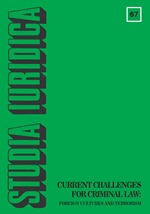INSTYTUCJA ZATARCIA SKAZANIA W POLSKIM PRAWIE KARNYM
THE INSTITUTION OF ERASURE IN THE REGISTER OF CONVICTS IN POLISH CRIMINAL LAW
Author(s): Magdalena BłaszczykSubject(s): Law, Constitution, Jurisprudence
Published by: Wydawnictwa Uniwersytetu Warszawskiego
Keywords: instytucja zatarcia skazania; polskie prawo karne; kodeks karny;
Summary/Abstract: The paper concerns the general matters of erasure in the register of convicts in Polish criminal law. The author explains the nature of this institution and all consequences related to it. The most important consequence of erasure in the register of convicts is the fact that a person who was convicted for an offence, and even for a crime, after a period of time – determined by law – for which entry in the register of convicts is valid, is treated like a person who was never convicted. It supports such a person to go back to society, to find a work, etc. The institution of erasure in the register of convicts based on a legal fiction – a fiction stating that a sentenced person was not sentenced. The basic way of erasure in the register of convicts in Polish criminal law is erasure in the register of convicts on the strength of law, after a period of time from fulfillment of punish, remission or expiration of execution of a sentence. This way of erasure in the register of convicts is a general rule guaranteed by Polish Criminal Code. But the amendment to Polish Criminal Code puts in force an exception from this general rule. Since 26th September, 2005 convictions for sexual offences do not come under the erasure of conviction (art. 106a of the Polish Criminal Code). This solution lies down a life-burden of a conviction to all convicted persons. All data related to non-erasure conviction will be kept at National Penal Register until the death of a convicted person, what generates a lot of negative consequences for a convicted person. An article 106a of Polish Criminal Code was well grounded, and shown as a good method of fight against a sexual offences which do harm for children, committed by persons with sexual disturbances. Unfortunately an exception created by an article 106a Polish Criminal Code is applied not only in case of convictions such persons. So it should be described more precisely. The rules of an erasure in the register of convicts – as an important institution of criminal policy – should be created with consideration of the consequences of erasure/not erasure in the register of convicts.
Journal: Studia Iuridica
- Issue Year: 2006
- Issue No: 46
- Page Range: 9-35
- Page Count: 27
- Language: Polish

